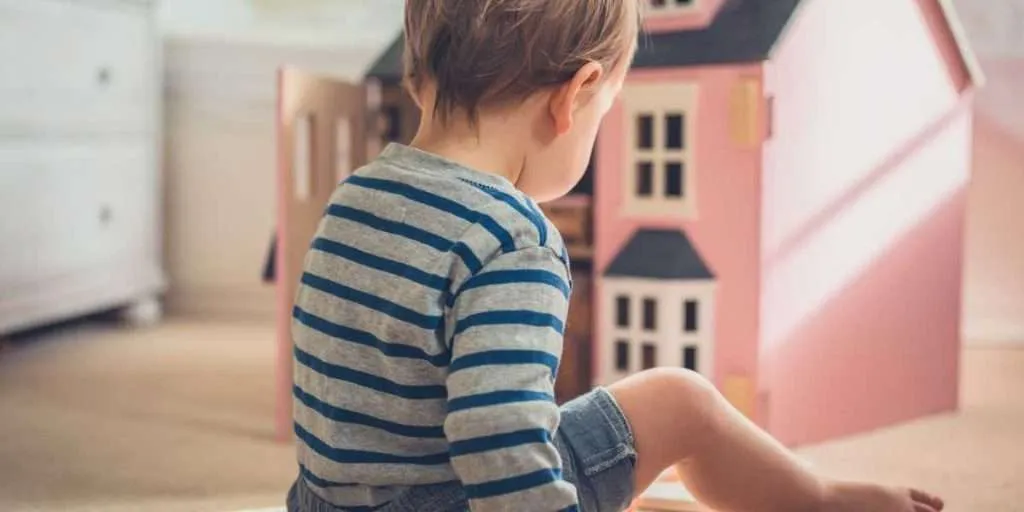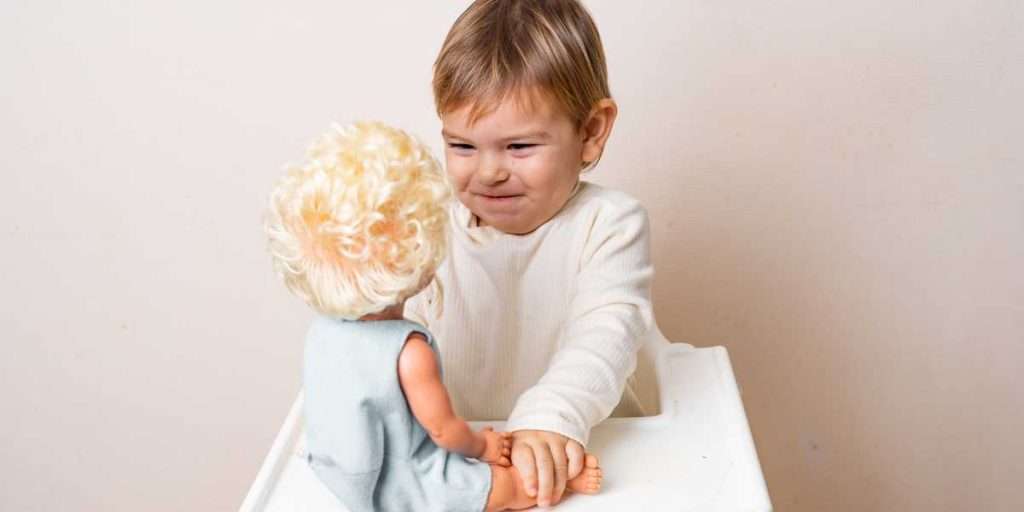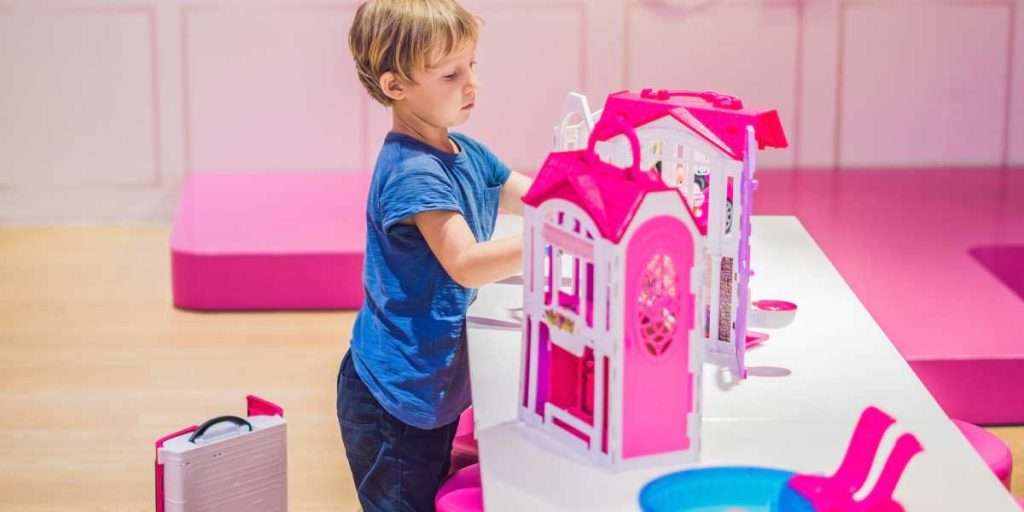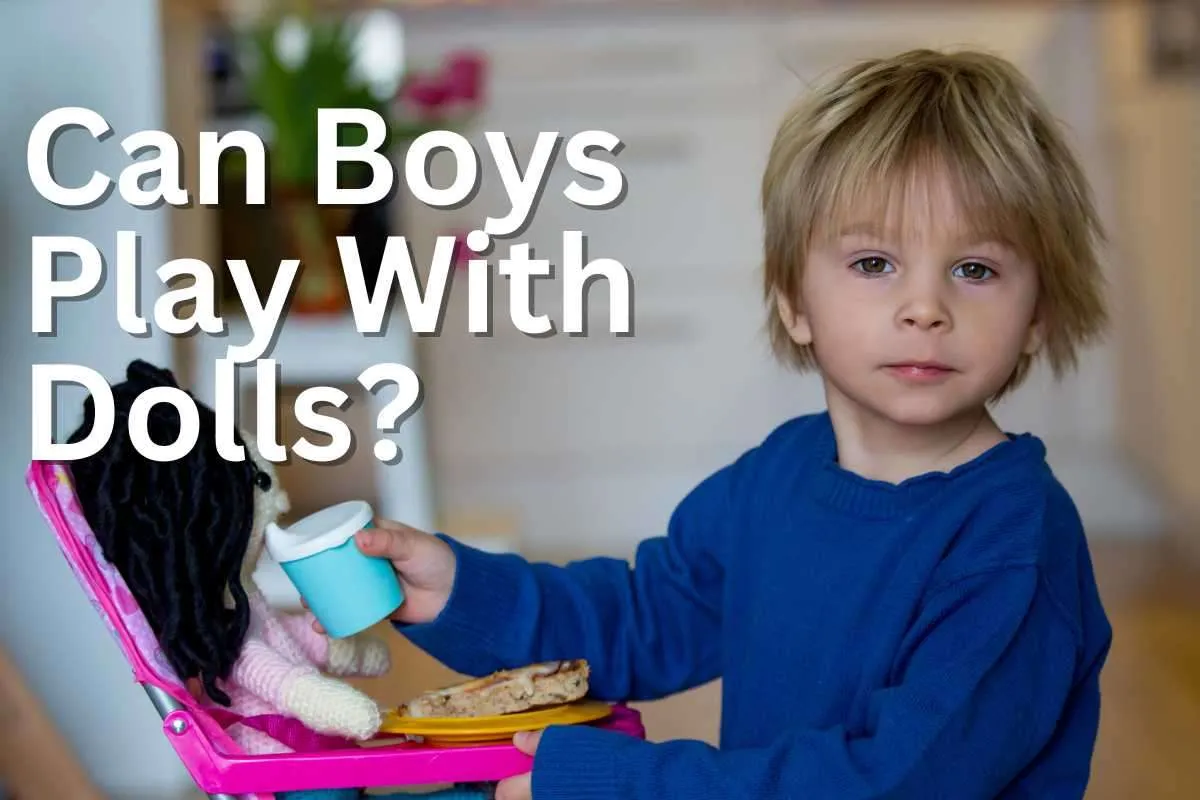Delving into the topic of boys playing with dolls and curious about the underlying benefits? You’re not alone. While traditional gender norms have often categorized dolls as “girls’ toys,” a growing body of research and understanding emphasizes the numerous advantages dolls offer to children of all genders.
Playing with dolls can significantly contribute to a child’s holistic development, transcending the confines of gender stereotypes.
Drawing from my expertise in child development, I’ve crafted a comprehensive guide that highlights the reasons boys should be encouraged to play with dolls.
Let’s journey together, breaking down age-old barriers, and explore the myriad of skills and values dolls can instill in young boys.
Can Boys Play With Dolls?
For many people this might seem like a silly question. Boys can play with dolls, just like girls can play with diggers and dinosaurs. Right?
And yet there is still a lot of gender stereotyping that is attached to different toys, and still plenty of people who might give you a funny look or even make a comment if they see your little boy playing with a doll.
Dolls are all about role play and playing pretend. Little girls and boys playing with dolls are acting out being parents and learning valuable life skills in the process. From the fine motor skills needed to button a shirt to learning empathy and how to care for others.
Playing with dolls uses the imagination and it’s fun so why would we not give little boys this opportunity as well as little girls. We firmly believe that parents should encourage all children to play with whatever toy they wish to play with- even if that is a baby doll!
Perhaps your little boy playing with dolls is excited to be a dad one day!

REASONS BOYS SHOULD PLAY WITH DOLLS
Playing with dolls isn’t just for girls; boys can also benefit significantly from this form of play.
| Reason | Benefit Description |
|---|---|
| Emotional Development | Playing with dolls helps boys understand and express their feelings, developing empathy and compassion. |
| Social Skills | Role-playing with dolls can improve communication, cooperation, and understanding of social roles and relationships. |
| Nurturing Instincts | Caring for dolls fosters nurturing instincts, promoting qualities like kindness, care, and responsibility. |
| Life Skills | Activities like feeding, dressing, and bathing dolls teach boys essential life skills they’ll use as adults. |
| Imagination & Creativity | Imaginative play with dolls stimulates creativity and storytelling skills. |
| Motor Skills | Dressing dolls and manipulating their small accessories can enhance fine motor skills and hand-eye coordination. |
| Cognitive Development | Setting up scenarios, solving problems, and engaging in role-play activities with dolls can boost cognitive functions and problem-solving abilities. |
| Understanding Diversity | Playing with diverse dolls can help boys understand and appreciate differences in race, culture, and physical abilities. |
| Preparation for Sibling Care | For boys expecting a new sibling, dolls can help them practice and understand the basics of baby care. |
| Breaking Gender Stereotypes | Encouraging boys to play with dolls challenges traditional gender norms and promotes a more inclusive, non-stereotypical understanding of play. |
| Language Development | Conversations and narratives created during doll play can enhance vocabulary and language skills. |
Despite the fact that seeing a man carrying their baby, pushing a pram or playing with their kids in the park is about as manly as it gets, dolls and prams are still seen as somewhat girly toys. But why?
Is it because there’s an excess of pink and we’re somehow programmed to think of that as a girly colour? Is it that most baby dolls are girls?
Although thankfully that’s beginning to change. Is it that little boys get told dolls are for girls and so, therefore, see them as girly toys? And why then are stuffed animals deemed acceptable for a female child and not a male?
Although your son will never give birth you need a man and a woman to make a baby so your son is just as likely to become a parent.
In fact, they are much more likely to become a parent than they are a race driver, carpenter or astronaut which should mean that playing with dolls is about as gender-neutral as it gets.

So how can we change this perspective?
Benefits
- Learning though play. Kids learn when they play. Playing with dolls can teach about caring for another person, great if you have a new sibling on the way, as well as social skills and practical skills like doing up buttons or getting trousers on the right way round.
- Role playing situations. Playing with dolls can be a great way for children to act out challenging or new situations. You can talk to them about sharing, looking after each other, what to do if they encounter bullying and all sorts of other things.
- Comfort. Children will often talk to dolls and soft toys as if they are their best friends. They’ll take them with them on adventures and cuddle up with them at night. A doll can help a child get through their first day at nursery, give them comfort when they are feeling poorly, or just keep them occupied on a long car journey.
And if you are worried what other people might say to your child to respectfully say that there is nothing girly about holding a baby- perhaps your son will have a family of his own one day, after all.
It’s time that we as a society stopped pigeon holing women in to nurturing roles and men in to positions of authority- these messages about stereotypical male and female interests/aspirations are presented from kids very early on- when it should just be about playing with whatever toy is the most fun!

Problems with gender stereotypes in toys
Gender stereotypes in toys can have a significant impact on children’s development, self-perception, and understanding of societal roles. These stereotypes can limit children’s experiences, aspirations, and potentials.
| Problem | Description |
|---|---|
| Limited Exploration | Gender-specific toys can limit children’s exposure to a wide range of play experiences, potentially restricting their development in certain areas. |
| Reinforcement of Traditional Roles | Toys that reflect traditional gender roles (e.g., kitchen sets for girls, tool sets for boys) can perpetuate outdated views of male and female roles in society. |
| Reduced Emotional Expression | Boys might be discouraged from playing with dolls or other “emotional play” toys, potentially limiting their emotional development and expression. |
| Narrow Career Aspirations | Stereotyped toys can influence children’s perceptions of suitable careers. For instance, science and construction toys often target boys, while domestic playsets target girls. |
| Body Image Issues | Gendered toys, especially dolls or action figures, can promote unrealistic body standards, potentially leading to body dissatisfaction. |
| Limited Social Skills | Gender segregation in toys can reduce opportunities for boys and girls to play together, limiting the development of comprehensive social skills. |
| Reduced Cognitive Development | Some educational toys are gender-targeted, which can deprive one gender of cognitive challenges and growth opportunities. |
| Perpetuation of Stereotypes | Gendered toys can reinforce societal stereotypes, leading children to believe that certain activities, behaviors, or interests are exclusive to one gender. |
| Restriction of Identity Exploration | Strict gender norms can suppress children’s exploration of their identities, possibly affecting their understanding of gender fluidity and diversity. |
| Economic Implications | Gender-targeted marketing can pressure parents to purchase separate toys for children of different genders, even when the toys have minor differences. |
| Inequality Reinforcement | Emphasizing differences and value judgments between “boys’ toys” and “girls’ toys” can reinforce broader societal inequalities and biases. |
Promoting gender-neutral toys and diverse play experiences can help combat these problems, fostering a more inclusive, understanding, and well-rounded environment for children. Encouraging children to choose toys based on interest rather than gender expectations can have long-term benefits for individual development and societal progress.
These kinds of gender stereotypes are incredibly harmful, and, sadly are drummed in to children every time we expect girls to play dolls at their play kitchen and boys to stick to dinosaurs, mud pies and tool benches.
Many parents will hear comments about how their son shouldn’t push a pink stroller or enjoy dress up or playing with play kitchens; but what are we afraid of?
Do we really believe that boys don’t have the nurturing skills to become good fathers one day? What harm can playing with toys do, and why does society care so much? Do we really believe that the toys we hand our children will affect their gender identity?
Thankfully, slowly, things are changing and the world is moving on from telling young children that a girl should play house while a boy child races around with toy cars.
Doing so will only reduce your child’s creativity an deprive them of lots of fun activities! Girl toys and boy toys will hopefully be a thing of the past one day so that no child has to miss out.
If you’re keen to give your child the opportunity to play with dolls from a young age before possible outside influences have a look at some of the best dolls for babies.
Baby Boy Dolls
If you have a little boy, you might want to give him a doll that’s a boy too. Our Ruben’s Barn Dolls are by far our most popular dolls, amongst both boys and girls.
These are empathy dolls, designed to spark imaginative play and emotional development. They are also anatomically correct, meaning that they have the appropriate body parts. This sends the message to your son that there is nothing wrong with these parts, they are not to be hidden/censored.
These are a soft doll, and one of the most popular reasons parents buy a baby doll is to encourage nurturing skills and ‘gentle hands” ahead of the birth of a new sibling. They are also a great aid in settling young children in to school .
Your little boy will just love to play dad with his own baby, re enacting what he sees at home. It’s no bad thing for boys to be taught these vital skills-if they decide to have their own family one day, they need as much prep to be fathers as a little girl does.
Is it okay for boys to play with American Girl dolls?
Some boys prefer to play with dolls that look like older kids and can be dressed up, and, again, our advice would be to let your kids play with dolls if they wish to, regardless of gender. Boys playing with dolls seems to be seen as strange, but in reality, boys playing with dolls get the same enjoyment as girls do- they are learning about the world around them and engaging in imaginative play. And there’s nothing wrong with that!
It’s a good thing to teach kids to do what makes them happy in life- after all, they are only kids for a short time. In no time at all, your son won’t even remember that he used to play with dolls.
Why It Is Okay to Let Your Little Boy Play With Dolls
It is definitely okay for a little boy to play with dolls. In fact, it is being encouraged by many child experts because of the developmental benefits of playing with dolls.
Back in the old days, little boys playing “make-believe” daddy was frowned upon and even ridiculed. While there are still people who can’t accept that boys are allowed to play “girly” toys, more parents are encouraging their boys to play with dolls. And that’s a good thing.
The Perfect Toy
Dolls are now seen as gender-neutral toys which means that both girls and boys can play with them. They are the perfect toys for growing kids because they provide a lot of entertainment value as well as they are fantastic early developmental toys.
They provide companionship to little as both them and their dolls explore the world around them.
Choosing the right doll is also important to maximise learning and for the safety of your child. Make sure to read labels and warnings for any potential choking hazards. Dolls with detachable parts should be played with adult supervision.
It is highly recommended to buy traditional dolls like rag dolls rather than battery-operated dolls that do a lot of things. Rag dolls encourage children to use their imagination and creativity while battery-operated dolls don’t.
You can buy boy dolls especially for boys to play with. And yes, before you ask boys there are dolls houses for boys as well!
Learning Through Play
Children learn through play. It allows little kids to express themselves and build their self-worthy by making them feel good about themselves. It also allows them to explore many ideas with fewer to no restrictions which makes it more fun and enjoyable.
Role playing and imaginative play are important in skills development. Using the imagination is always fun and helps improve a child’s creativity. It also allows children to see things in different perspectives and helps them develop a strong problem-solving skill in dealing with problems.
Toys for All Kids
Dads are just as important as moms when it comes to parenting then little boys and girls should have access to and be allowed to play with dolls. Playing with dolls provides a fun opportunity for little boys to act out scenarios and practice becoming nurturing fathers. It also teaches them to become more responsible and makes them open-minded as they grow older.
Restricting kids to play toys based on their gender is such an outdated view. As parents, we want the best for our children and we should support them. There’s nothing wrong with a little boy playing with dolls.
Dolls are just toys and little kids should be allowed to play with whatever toy they’re interested in. This is innocent play and should be left alone. If your little boy wants to play with dolls then encourage his nurturing side by allowing him to play with one.
Most kids emulate what they observe their parents doing and your little boy will take care of his baby doll just like how you take care of him.
The Bottom Line
The idea of boys playing with dolls might raise some eyebrows, but if your little boy wants to play with dolls, we can’t think of any reason why they shouldn’t! Play is how kids learn, and often the best way to learn is through toys that will be played with and enjoyed for hours on end.
So if your boy has a doll on his Santa list this year, don’t waste your money on cars that will gather dust- get your son the doll that he really wants and will enjoy and grow with.





